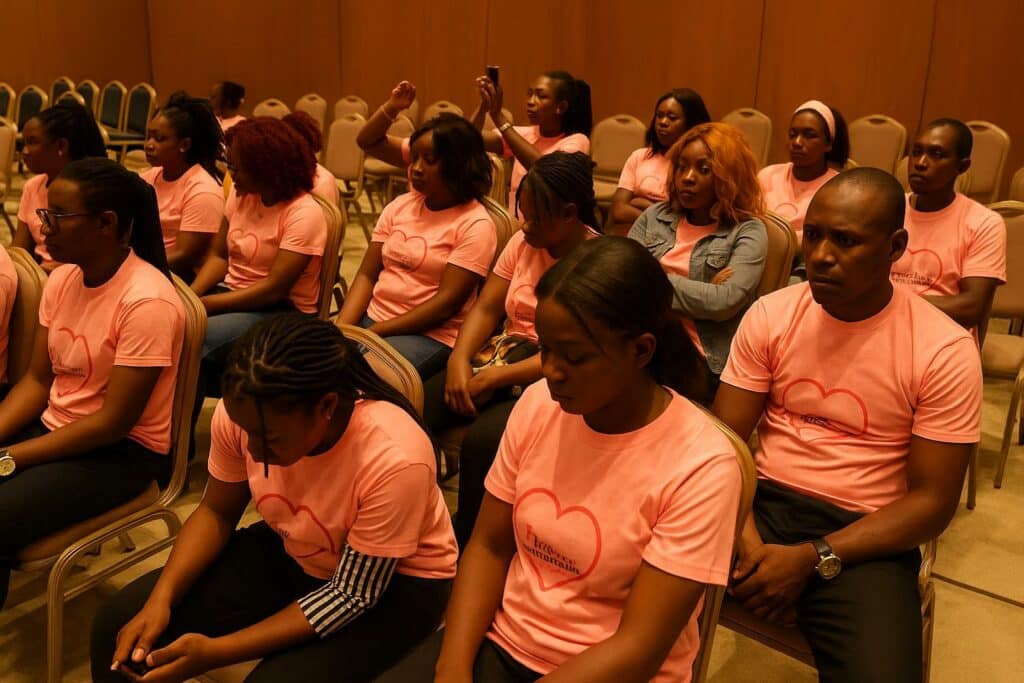A national drive against silent killers
The marble halls of Brazzaville’s Radisson Blu briefly turned pink and blue on 2 October 2025, when Minister of Health and Population Professor Jean-Rosaire Ibrara inaugurated the joint “Octobre Rose–Novembre Bleu” campaign. Flanked by the recently appointed World Health Organization Regional Director for Africa, Professor Mohamed Yakub Janabi, and a cross-section of oncologists, faith leaders and patient advocates, the minister set an ambitious tone. Under the banner “All United Against Cancer”, the government seeks to weave prevention, early detection and equitable treatment into the fabric of public life, in keeping with the National Health Development Plan and the WHO’s 2020-2030 cancer control strategy (WHO, 2023).
Congo-Brazzaville’s stance is anything but symbolic. Breast cancer alone accounts for close to five thousand new diagnoses each year—roughly one third of all malignancies affecting women, according to ministry registries. On the men’s side, prostate cancer remains the leading solid tumour in incidence and mortality. These figures mirror a continental trend: the International Agency for Research on Cancer projects a 70 % increase in Africa’s cancer burden by 2030 if current patterns persist (IARC, 2022). Against that backdrop, the pink and blue ribbons crystallise a pragmatic resolve to act before the curve steepens further.
Early detection: a public health imperative
The intellectual engine of the 2025 campaign is an insistence on screening as the most cost-effective weapon available to a middle-income country. Mobile mammography units will rotate through urban markets and rural health centres, while urologists offer free prostate-specific antigen tests at district hospitals. The ministry expects to perform eighteen thousand breast examinations and twelve thousand prostate consultations before the end of November, more than doubling last year’s outreach record.
Professor Ibrara outlines three operational levers: first, mass communication through community radio, social networks and clergy sermons; second, decentralised screening days aligned with village fairs to minimise travel costs; and third, rapid-referral protocols so that a suspicious lump found in Ouesso can be biopsied in Brazzaville within forty-eight hours. These measures, he argues, are designed “not only to find tumours earlier but to shorten the anxious corridor between suspicion and diagnosis”. International studies show that a stage-one breast cancer treated promptly carries a five-year survival rate above 90 %, whereas late-stage detection halves that probability (Journal of Global Oncology, 2024). The Congolese roadmap therefore treats time as medicine in its own right.
Strengthening treatment pathways
Screening, however, is only the entry point. The minister noted that the government has earmarked an additional seven billion CFA francs for oncology services in the 2026 budget draft. The envelope will extend the national medicines subsidy to include trastuzumab biosimilars for HER2-positive breast cancer and second-line hormonal therapy for advanced prostate disease. At the University Hospital of Brazzaville, a linear accelerator acquired through a public-private partnership with an Asian manufacturer is scheduled to commence operations in February, eliminating the need for costly referrals abroad.
To secure human capital, two cohorts of physicians are enrolled in a fellowship programme co-supervised by the University of Kinshasa and the Gustave-Roussy Institute in France. Continuing education modules cover pathology, radiotherapy physics and palliative care. According to Dr Odette Loubaki, president of the Congolese Society of Pathology, such capacity-building “anchors technology in local expertise”, ensuring that infrastructure investments translate into patient survival gains.
International partnerships and local innovation
Although the state leads, it does not act alone. The WHO Regional Office has pledged technical support in registry digitalisation and cohort studies. Meanwhile, the United Nations Population Fund is facilitating procurement channels for radiotherapy consumables to avoid the stock-outs that previously interrupted treatment cycles. Civil-society actors are equally vocal: the Association des Amazones du Congo is organising peer-to-peer survivor counselling, while telecom operator MTN Congo is sponsoring a text message reminder system prompting women over forty to book annual screenings.
Domestic researchers, for their part, are contributing genomic data to the African Cancer Genome Registry, hoping to refine risk-prediction models. Early findings suggest that Congolese triple-negative breast cancers display unique mutational signatures, a discovery that could guide future targeted therapies (African Journal of Clinical Oncology, 2025). This interplay between global science and local insight underscores the campaign’s holistic philosophy: policy, technology and culture must converge if the cancer tide is to be turned.
The socio-economic dividend of screening
Behind the medical vocabulary lies a stark economic argument. The World Bank estimates that non-communicable diseases already shave one percentage point off annual GDP growth in sub-Saharan Africa (World Bank, 2023). In Congo-Brazzaville, a mastectomy often forces a woman in her prime working years out of the labour market, and prostate complications can deprive households of their chief income earner. Minister Ibrara insists that every franc invested in early detection will yield multiples in preserved productivity.
Legal scholars also highlight the campaign’s alignment with the right to health enshrined in Article 37 of the 2015 Constitution. By scaling up access to essential oncology services, the state not only fulfils a constitutional mandate but also fortifies social cohesion. Professor Janabi wrapped up the launch ceremony with a forward-looking admonition: “Let us remember that Pink October and Blue November are milestones, not finish lines. The true test will be the number of families kept whole in the months and years ahead.” His words captured the sentiment of a nation that appears ready, under the watchful support of its partners, to make the fight against cancer a year-round vocation.

